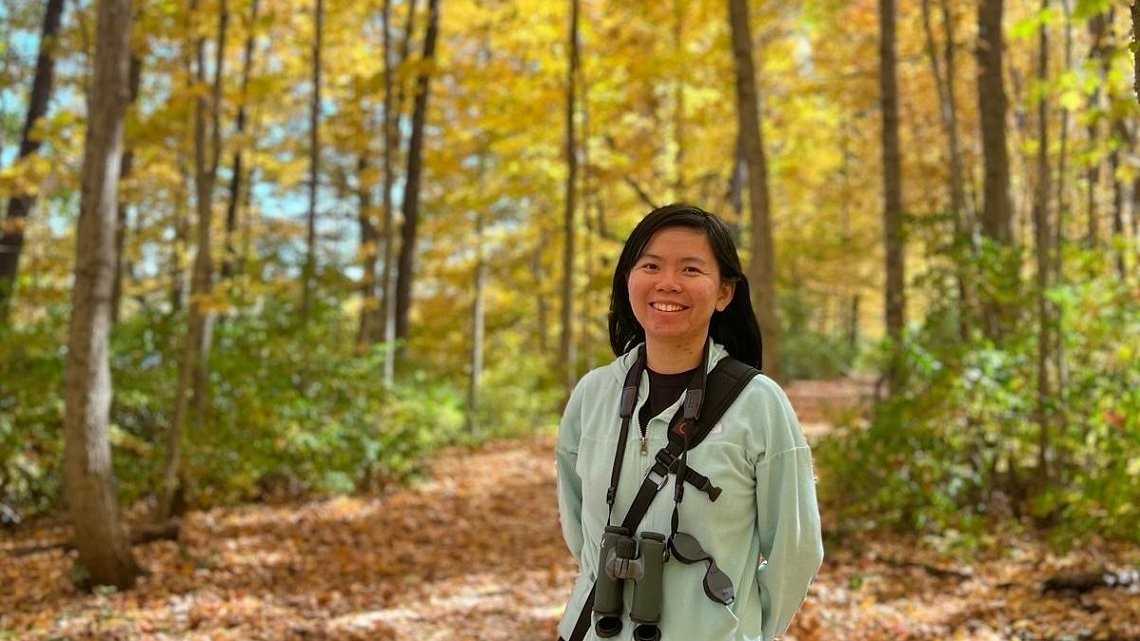
2024 Cornell Atkinson Postdoctoral Fellow Fengyi Guo doing fieldwork in Southern Indiana during fall bird migration.
News directly from Cornell's colleges and centers
Postdoctoral fellows to lead sustainability research on four continents
By Krisy Gashler
The 2024 cohort of Cornell Atkinson Postdoctoral Fellows will conduct research on four continents, studying migratory birds in North America, fisheries in Kenya, dairy production in India and gold mine remediation in Peru.
Postdoctoral fellowships from the Cornell Atkinson Center for Sustainability support early career scholars, who conduct research under the mentorship of a Cornell faculty member and an advisor from an external partner organization. Fellows are selected for two-year appointments. This is the program’s 10th year.
“Cornell Atkinson Postdoctoral Fellowships provide a great deal of independence and latitude to pursue applied sustainability research early in a researcher's career, which is not often the case,” said Beth Fox, director of student and postdoctoral programs for Cornell Atkinson. “This is an individual career launchpad and a path to advancing sustainability for our collective benefit.”
The 2024 Cornell Atkinson Postdoctoral Fellows are:
Fengyi Guo: Long-term trends in migratory landbird stopover density following 30 years of land-use change in the contiguous United States
The population of North American birds has dropped nearly 30% since 1970, and migratory landbirds are particularly threatened. Research and conservation efforts have largely focused on birds’ breeding and wintering grounds, but less is known about how disruptions during migration may contribute to population declines. Guo will use remote sensing data from weather radar and citizen science data from eBird, the Lab of Ornithology’s online database of bird observations. She will then reconstruct changes in migratory landbird populations over the past 30 years along stopovers in their routes across the contiguous United States. Guo will also quantify the impacts of past land-use changes and, in coordination with the U.S. Department of Agriculture’s Natural Resources Conservation Service (NCRS), develop conservation recommendations.
Cornell faculty mentor: Andre Dhondt (Cornell CALS, Lab of Ornithology)
External advisor: Bridgett Costanzo, M.S. ’89, (USDA-NCRS, Washington, DC, USA)
Sandra Klemet-N'Guessan: Closing nutritional gaps using a nutrient-rich lake: integrating catch composition and cultural preferences to optimize diets and sustain fisheries
Fisheries provide protein and a host of essential nutrients with a low environmental footprint relative to other animal-sourced foods, and their contributions to food security in many biodiverse regions would be difficult to replace. However, wild fisheries are threatened by overharvesting and habitat destruction. Klemet-N'Guessan will develop a database of nutrient profiles of key fishery species in Africa’s Lake Victoria and analyze how wild and farmed fish species could be mixed most efficiently in a diet. The overall goal of this research is to maximize nutritional outcomes for people while minimizing harvest pressures on wild fish species.
Cornell faculty mentor: Pete McIntyre (Cornell CALS, Ecology & Environmental Biology)
External advisor: Kevin Obiero (Kenya Marine and Fisheries Research Institute, Mombasa, Kenya)
Ashish Kumar: Dietary seaweed supplementation to support milk production and methane mitigation in cattle raised by smallholder farmers of India
India’s dairy contributes ~25% of the global milk production. It employs more than 80 million farmers with 70% being smallholder farmers. Ashish will assess the challenges faced by the small holder dairy farmers in India, identify pathways to improve their productivity and promote climate resilience. The study will also explore the use of seaweed as a potential feed additive for maintaining animal health, enhancing productivity and reducing climate-warming methane emissions. Seaweed feeding has been shown to reduce enteric methane emissions by more than 80% in cattle, and 844 species of seaweed have been reported off the Indian coastline. This study will provide insights for achieving the sustainability in dairy in developing economies.
Cornell faculty mentor: Joe McFadden (Cornell CALS, Animal Science)
External advisor: Bharat Kakade (BAIF Development Research Foundation, Pune, India)
Gisselle Vila Benites: Developing an indigenous monitoring framework for post-mining environmental remediation in the Peruvian Amazon
Gold mining in the Amazon damages soils, water quality and biodiversity. Post-mining remediation strategies primarily focus on land-based solutions, such as reforestation, but rarely engage with indigenous knowledge and needs. Vila Benites will develop an indigenous environmental monitoring framework to account for the recovery potential of post-mining areas in the Peruvian Amazon, including lands and abandoned ponds. Her project will rely on participatory workshops, geospatial analysis, walking interviews and validation surveys. She seeks to improve the sustainability of environmental remediation interventions, strengthen indigenous livelihoods and food security, and influence policymaking around mining.
Cornell faculty mentor: Lori Leonard (Cornell CALS, Global Development)
External advisor: Renzo Piana (Instituto del Bien Común, Lima, Peru)
Media Contact
Get Cornell news delivered right to your inbox.
Subscribe
